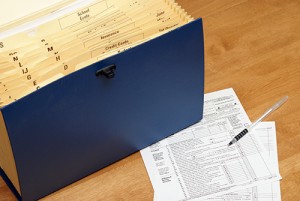
The length of time you should keep a document depends on the expense or event that the
document records. Generally, you must keep your records until the period of limitations for that return runs out.
General Rule – The period of limitations is the period of time in which you can amend your tax return to claim a credit or refund, or that the IRS can assess additional tax. The Statute begins to run from the later of that date the returns are filed or the due date which is typically April 15.
If you owe no additional tax and the following four situations do not apply to you; keep the tax records for 3 years.
However, if
1. You do not report income that you should report, and it is more than 25% of the gross
income shown on your return; keep your records for 6 years.
2. You do not file a return; keep your records indefinitely.
3. You file an amended return for credit or refund or a claim after you file your return; keep your records for 3 years from the date you filed your original return or 2 years from the date you paid the tax, whichever is later.
4. You file a claim for a loss from worthless securities or bad debt deduction; keep your records for 7 years.
Federal Income Tax Returns – Keep copies of your filed federal income tax returns forever. I recommend scanning them into your hard drive or cloud so they don’t take any space. Copies of previous federal tax returns help in preparing future tax returns, filing an amended return or applying for a mortgage or loan. In addition you should check to ensure all your wages and income have been reported correctly and match your Social Security earnings history. You can file Form SSA-7004 to get a copy of your earnings history from Social Security.
Employment Tax Returns and Records – Keep all employment tax returns and records for at least 4 years after the date that the tax becomes due or is paid, whichever is later.
Rental or Business Property – Keep records relating to the purchase and improvements on a rental or business property until the period of limitations expires for the year in which you sell the property. You must keep these records to verify any depreciation or amortization deduction taken in the years you owned the property, as well as to figure the gain or loss when you sell the property.
If you never sell the rental property and fully depreciate it over 29 1/2 years you need to keep a record of all your cost basis and improvements until 3 years after the 29 ½ year period ends to verify the depreciation in the event you are audited.
Section 1031 Property – Generally, if you received property in a nontaxable 1031 exchange, your basis in that property is the same as the bases of the property you gave up, increased by any money you paid. You must keep the records on the old property, as well as on the new property, until the period of limitations expires for the year in which you dispose of the new property in a taxable disposition.
Inherited Property – If you inherit property from an estate, you get a stepped up basis in the property which is the fair market value at the decedent’s date of death. Therefore you should keep a copy of the appraisal taken at the date of death, or the inheritance or estate tax return for as long as you own the property to verify your basis so when you sell the property you can calculate your gain. Keep in mind if you only inherit half of a jointly owned property you only get a stepped up basis in the half that you inherited and did not already own.
Primary Residence – Cost records for your primary residence and any improvements should be kept until the home is sold. Note that a net gain (selling price less the basis and expenses of sale) are less than $250,000 if you are single or $500,000 on a joint return isn’t subject to income tax. However, the home had to be your primary residence for 2 out of the last 5 years prior to the sale. If the net gain profit is more than $250,000 ($500,000 on a joint return), or if you don’t qualify for the full gain exclusion, then you’re going to need those records for another three years after that return is filed.
Brokerage Statements and Cancelled Checks – When your records are no longer needed for tax purposes, do not discard them until you check to see if you have to keep them longer for other purposes. For example, your insurance company or creditors may require you to keep them longer than the IRS does. Common examples are brokerage statements which should be kept for 7 years and bank statements and cancelled checks which should be kept for 7 years.
If you are not sure how long you should keep a specific document feel free to call Spadea & Associates, LLC at 610-521-0604 or email Gregory J. Spadea at Gregory@SpadeaLawFirm.com








